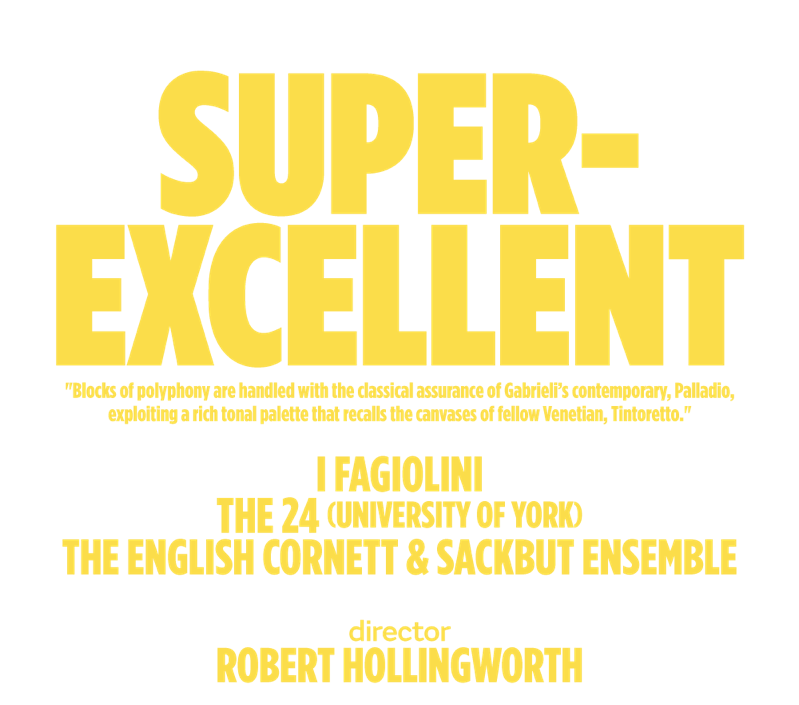
In 1608 the great travel writer Thomas Coryat visited Venice, and wrote, astounded, about a musical entertainment he witnessed at St Roch, “where I heard the best musicke that ever I did in all my life… so good that I would willingly goe an hundred miles afoote at any time to heare the like…, so delectable, so rare, so admirable, so super-excellent, that it did even ravish and stupifie all those strangers that never heard the like.”

SUPER-EXCELLENT
A sumptuous programme of multi-choir music from 17th century Italy, Spain,
Peru, Germany and England - for solo-voices, choirs, cornetts, sackbuts, lizard,
dulcians, shawm, recorder, organs and theorbos.
Giovanni Gabrieli (c.1514-1612) – Buccinate (four choirs)
Joan de Cererols (1618-76) – Missa Batalla (sections) (three choirs)
Alessandro Grandi (1586-1630) – O Intemerata (solo voice)
Juan de Araújo (1646-1712) – Dixit Dominus a 11 (three choirs)
Palestrina/Bovicelli – Ave verum corpus (cornetto & four voices)
Edmund Hooper (c.1513-1621) – O God of Gods (solos, two choirs & instruments)
Heinrich Schütz (1585-72) – Fili mi Absalon (solo & trombones)
Giovanni Gabrieli – In Ecclesiis (completed H.Keyte) (four choirs)
The singers are soloists from I Fagiolini plus either a local
professional choir or singers from the University of York’s ‘The 24’.
G.Gabrieli - In Ecclesiis (final section), York 2021
“I was for the time even rapt up with
Saint Paul into the third heaven.”
That’s a good attempt to put into words what it must have felt like to have been at such a musical feast. Perhaps Giovanni Gabrieli was in charge, the cream of Venice’s singers and players taking part, musical extravagance of the richest sort.
Our programme is framed by early 17th century Venice – the home of grand multi-choir music – but also goes to even more exotic climes. Joan Cererols spent his whole life at the monastery of Montserrat in Catalunia. His battle mass is for three choirs, each throwing phrases to the other, with delightful Hispanic syncopated rhythms. These continue in exaggerated form in a ‘Dixit Dominus’ from Juan de Araújo who worked in modern day Bolivia and Peru. The solo-writing is more virtuosic with even livelier rhythms, probably inspired by native secular music and featured in his own jácaras.
The English are thought to have missed out on multi-choir music (aside from Spem) but Bill Hunt’s restored version of Edmund Hooper’s dramatic ‘O God of Gods’ (for King James) changes our view of this, throws the kitchen sink into an extravagant final dialogue in which all instruments are praised in turn, and indirectly praise the union between England and Scotland...
Between these choral monsters, miniatures to refresh the aural palette. A lament by Schütz for bass and trombones (Wagner had the same idea), virtuosic solo tenor (Grandi) and the sweet combination of four voices and cornett, (seemingly improvising over a Palestrina motet).
The climax of Super-Excellent event is Giovanni Gabrieli’s famous ‘In Ecclesiis’ (on the A level syllabus) - but heard in new clothes. Our version is reworked so that the unlikely two solo voices (the piece was published only after Gabrieli’s death) are expanded into two further choirs, making the whole into an earth-shaking experience of 22 separate parts. Blocks of polyphony are handled with the classical assurance of Gabrieli’s contemporary, Palladio, exploiting a rich, dark tonal palette that recalls the canvases of his fellow Venetian, Tintoretto. Ever greater forces are called for in the recurring refrain, the final appearance of which has a heaven-storming rhetorical fervour that would remain unmatched until the era of Berlioz.
For further details, booking and availability contact:
Libby Percival libby@percius.co.uk - Tel: +44 7718 752481
Performers at Stour Music, 2021